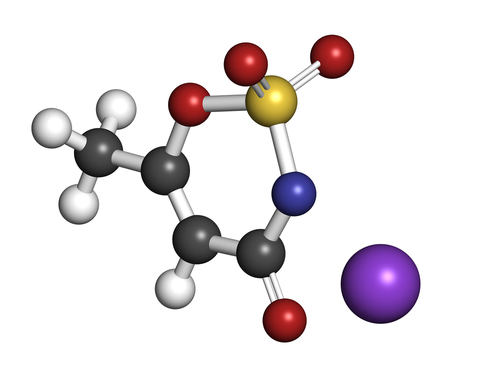Short answer
At this time, various studies have concluded consuming acesulfame potassium in small amounts is not bad for you, and shouldn't cause any long-lasting harm. Overconsuming the sweetener and/or ingesting large amounts at one time does, however, have the potential to negatively impact your health. Let's dig in.
Long answer
Since its accidental discovery in 1967, by a German scientist, more than 90 studies have been carried out on rodents and other animals. The animals received doses of an amount that is 1000 times greater than the maximum daily recommended amounts for humans. In most of these studies, there was little to no conclusive proof that acesulfame potassium causes any acute health conditions when used in moderate amounts. There is some inconclusive data that the sweetener may be carcinogenic or that excessive use of the chemical could have negative effects on neurological function.
In the last thirty years, there has been a significant increase towards the preference for sugar substitutes, commonly referred to as artificial sweeteners. These are food additives and drink sweeteners that have essentially no caloric value. They are designed to provide consumers with an alternative to sugar in order to aid in the reduction of sugar intake. These are typically synthetic chemicals, often discovered accidentally as reaction by-products. Many food and beverage companies are replacing sugar with artificial sweeteners, such as aspartame, sucralose, and acesulfame potassium in their low-calorie variety products. ‘Diet’ cereals, diet sodas, and ‘sugar-free’ or ‘reduced sugar’ deserts and snacks are among the commonly consumed foods containing artificial sweeteners.
Acesulfame potassium is marketed under the brand name “Sunett”, and is labeled, as an artificial sweetener. Acesulfame potassium is considered 200 times sweeter than sugar and only a fraction sweeter than that of saccharin or aspartame. It is used in many sugar-free products, frozen desserts, chewing gum, some tabletop sweeteners and to sweeten the taste of liquid medications. This additive allows the consumer with a sweet tooth to manage their caloric intake since it is a zero-calorie substance.
Acesulfame potassium has a slightly bitter after-taste and because of this, it is often blended with other sweeteners like aspartame. When blended with some other synthetic sweeteners, the substance gains significant health risks. Kraft foods has secured a patent to the addition of sodium ferulate to the substance in order to eliminate the bitter taste. This substance has been found to be harmless. The tolerable daily intake of the additive is fifteen milligrams per kilogram of body weight. It is generally not stored in the body. To cause acute toxic symptoms, an individual would have to ingest two gallons of liquid containing acesulfame potassium, which is nearly impossible. The human body quickly processes this substance, and then rapidly excretes it as waste through the urinary system. Additionally, acesulfame potassium is not broken down when exposed to the heat, so it is ideal for use while baking your favorite dessert. This artificial sweetener has a very long shelf life, making it a convenient substitute for sugar in the “sugar-free home”.
Acesulfame potassium is known to produce post-metabolic methylene chloride. Long-term exposure to methylene chloride can cause headaches, nausea, kidney damage, liver damage, thyroid complications and cancer. However, the amounts of methylene chloride are so minuscule, it is rendered as an ineffective health variable in the sweetener. Women that are pregnant or expecting to become pregnant should check with their physicians regarding the consumption of foods that contain acesulfame potassium or any other artificial sweeteners.
Some critics say that the sweetener has not been studied adequately or over a long enough period to be conclusive. These detractors strongly believe that the studies were corrupted, citing that quality standards were not well-maintained.
If you are diabetic or are insistent on having a sugar-free substitute, it appears that acesulfame potassium is a relatively benign chemical. However, for the majority of the population, it is healthiest to stick with locally made honey or use a small amount of organic sugar, which has a stronger flavor than ‘non-organic sugar’. Natural is always better, just keep it in moderation.
Possible long-term side effects
- cancer
- kidney damage
- liver damage
- thyroid complications
- headaches
- nausea
- negative effects on neurological function
- toxicity in high doses/fatal
Commonly found in
- carbonated beverages
- fruit juices
- beverage concentrates
- tabletop sweeteners
- dairy products
- ice cream
- desserts, gelatins
- fruit and vegetable preserves
- jam, jelly and marmalade
- baked goods
- confectionery
- chewing gums
- salad dressings
Ingredients to be aware of
- methylene chloride

Benefits
- helpful with weight control
- helpful with diabetes
- long shelf life
- oven friendly
- does not promote tooth decay
Healthier alternatives
- locally grown honey
- small amount of organic sugar
 Approved by
Approved by 















